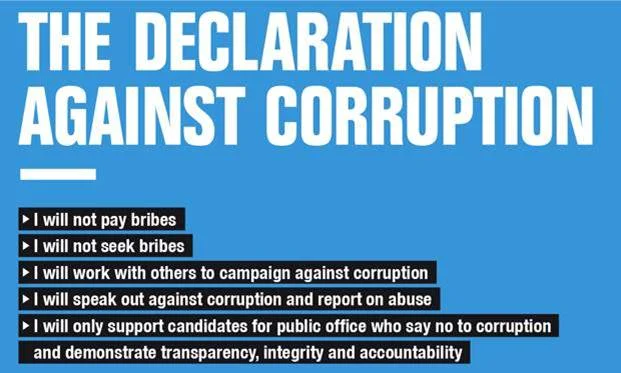Is The Anti-Corruption Movement Making Progress?
Frank Vogl gave the opening keynote conference address - the following is an extended version of his presentation.
This paper was prepared for the “Educating for Integrity” conference, 5 – 7 November 2015, York University, Toronto, Canada. The conference was sponsored and organized by the Canadian Business Ethics Research Network (CBERN) in conjunction with the Central European University Business School (Budapest)
Summary
The anti-corruption movement has grown at a rapid pace over the last quarter century. It has made formidable progress on many fronts and in many countries. The journey toward substantial elimination of corruption is long, the obstacles formidable and the skepticism ever-present. Yet thousands of determined and courageous activists across the world are dedicated to this cause and their impact is unleashing a dangerous set of responses – intimation, death threats, curbs on freedoms, censorship – by corrupt politicians who use their power to serve themselves at the expense of the citizens that they are mandated to represent.
Public awareness of the issues of corruption has never been greater: from the impunity of corrupt politicians, public officials and their business cronies, to money laundering, rigged political campaigns, secretive political party financing, manipulation of the banking and financial systems, conspiracies to secure kick-backs to public officials by corporations, to the brazen abuse and victimization of tens of millions of people. This results from the combined forces of the Internet and new information technologies, the growth of non-governmental organizations, the massive increase in all forms of investigative journalism with a focus on corruption. Knowledge is power and never before has there been so much attention on researching diverse aspects of corruption in academia, in “think tanks,” in governments and in NGOs.
The anticorruption movement can claim to have contributed to progress in many areas, including: human security; international security; global commerce; banking and finance; and, justice. We need to consider such claims and applaud the successes. In many areas we now see unprecedented multilateral official initiatives and national government actions that combine to seek to reduce the impact of corruption – this is exemplified by the agreement at the United Nations in late September 2015, of the Sustainable Development Goals to 2030, which include Goal 16 on justice and anticorruption.
Nevertheless, at best the anticorruption movement can claim that it has reached Base Camp, which is significant – there remains an Everest of corruption to be surmounted. Above all we must: ensure that far more is done to combat impunity by strengthening institutions and systems of justice; and, we must work tirelessly to see that the current framework of official conventions and anticorruption laws and regulations are fully enforced. These are vital areas of activity to ensure that all forms of corruption are sufficiently reduced so that the basic rights of all people are secured and that we may live in a world where everyone can live in dignity.
The anti-corruption movement has made progress on many fronts in many countries over the last quarter century. The journey toward substantial elimination of corruption is long, the obstacles formidable and the skepticism ever- present.
This detailed paper traces the progress that the anticorruption movement has made on many issues in many countries. The paper highlight today’s key challenges. The paper was prepared for a conference at York University, Canada, November 5-7, 2015 titled “Educating for Integrity.”
The purpose of this paper is to provide a substantive introduction to students and the public at large into the work of the anticorruption movement.
Download the full comprehensive paper: -
Is the anticorruption movement making progress?

